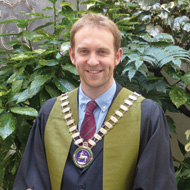
Aberystwyth University training hub will help prepare 'vets of tomorrow'
Plans to open a new training hub at Aberystwyth University were welcomed this week by the BVA's president, Sean Wensley.
He said that while new veterinary courses come with "risks and opportunities", the hub will help to safeguard animal health, promote animal welfare and better support Welsh farmers.
Last week, Aberystwyth and the RVC announced a joint veterinary medicine programme that would focus on farming and livestock.
Speaking to guests at the BVA's annual Welsh dinner yesterday (21 June), Mr Wensley said the programme will help to prepare future vets with the training, skills and knowledge for their varied roles.
"A new hub of veterinary expertise and excellence is an exciting initiative that brings together the right resources to deliver a range of potential training opportunities to Wales’ vets of tomorrow.
"There are of course both risks and opportunities in increasing the number of veterinary undergraduate courses - particularly in ensuring that there are good clinical career prospects for graduates – but this hub will help safeguard animal health; promote animal welfare; and better support the farmers and other animal owners we work with across Wales."
Mr Wensley also renewed calls to the Welsh government to reconsider its TB eradication programme. While quarterly data shows the number of Welsh herds under restriction is at its lowest point in 10 years, he warned that TB statistics can fluctuate, "…which is why we're continuing to urge the government to reconsider its eradication programme to include the targeted and humane culling of badgers, by means of cage trapping and shooting only, particularly in light of the suspension of the badger vaccination programme."
Addressing 70 delegates at the dinner, the president also recognised Wales's many successes in terms of animal welfare, including new legislation to tackle horse fly-grazing, irresponsible dog breeding and the creation of a code of practice for the use of snares in fox control.
Article amended as in a previous version 'training hub' was referred to as 'vet school'



 The Animal and Plant Health Agency (APHA) has updated its online reporting service for dead wild birds.
The Animal and Plant Health Agency (APHA) has updated its online reporting service for dead wild birds.